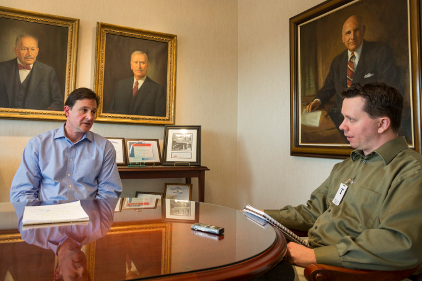WEB EXTRA
Exclusive Q&A with Nick Meriggioli, president of Oscar Mayer
Andy Hanacek, editor-in-chief of The National Provisioner, sat down with Nick Meriggioli, president of Oscar Mayer, to discuss the Oscar Mayer product-development dynasty.

 During his visit to Oscar Mayer headquarters in February 2013 to field the April 2013 cover story for The National Provisioner, Andy Hanacek, editor-in-chief, sat down with Nick Meriggioli, president of Oscar Mayer, to discuss the Oscar Mayer product-development dynasty and where the brand is heading. We present you the highlights of their conversation, in an exclusive, online-only Q&A format. Meriggioli began the interview with an overview of Oscar Mayer, as follows:
During his visit to Oscar Mayer headquarters in February 2013 to field the April 2013 cover story for The National Provisioner, Andy Hanacek, editor-in-chief, sat down with Nick Meriggioli, president of Oscar Mayer, to discuss the Oscar Mayer product-development dynasty and where the brand is heading. We present you the highlights of their conversation, in an exclusive, online-only Q&A format. Meriggioli began the interview with an overview of Oscar Mayer, as follows:
Meriggioli: As you know, we are now part of the new Kraft Foods. We’re excited about the change because we’re actually a bigger piece of the overall organization — close to 20% of the new company, which wasn’t the case at the old Kraft Foods.
We’re also excited that a key focus of our organization is to invest back into the great brands we have here in North America.
We were a much bigger organization previously with a lot of growth internationally and in some of our snacking brands; due to the company size not all of the investment that we had on this business went directly to our brands. Focus can be good.
Our priority in this business is first and foremost about building these great brands. Oscar Mayer is an over-$3 billion retail brand — one of the largest in the grocery store. Lunchables, a business we created back in 1987, is approaching a $1 billion business now, and it continues to grow and do extremely well. Our job is to ensure those two brands continue to be loved and trusted by not only today’s consumers, but also the next generation of consumers.
Another key focus area is delivering innovation that’s going to grow our categories.
We are the market leader in cold cuts; we’re the market leader in bacon; we’re one of the market leaders in hot dogs; we’re obviously the market leader in meal combinations, a category that we created.
In my opinion, growing the categories in which you compete is a critical part of being the market leader. So we spend a lot of time thinking about how we can find better ways to develop products that are better for our consumers and more convenient for them.
We’ve been talking quite a bit recently as an organization about some of the bigger, better innovation that we’ve accomplished across Kraft Foods. One of the examples we’re very proud of is our Oscar Mayer Selects portfolio of meats. It’s a line that we launched back in 2011.
It started in hot dogs, and we expanded it to cold cuts and bacon. Selects is a line of great quality products that also offers no artificial preservatives, and no artificial flavors. This year, we’re making it gluten free. And, it’ll be a close to $150 million brand for us in 2013.
I believe Oscar Mayer has always been about making great, quality products affordable, and that’s what we’re going to continue to do.
Which leads me to my last key area: One of the big goals we are working towards is to become one of the best operators as well. We need to find even better ways to procure our meat products, to manufacture our products and to distribute our products. You know, we’ve been focusing significantly on looking across our entire supply chain to find and eliminate any waste that may be there. That’s the fuel that will keep the business rolling.
Hanacek: Out of those three key pieces, where do you see the biggest potential for improvement or growth? Is there one that stands out to you?
Meriggioli: We’ve always been an organization, I would argue, that has been very good at marketing, innovation and sales. I think we have an opportunity to continue to improve to become the best operators we can be. Again, by doing that it’s going to help us fuel the investment we need to market our brands and drive our innovations.
I think in that area, particularly, we’ve got some opportunities.
Hanacek: Do you think that’s more on the conceptual part, like the operations management working more efficiently, or is it investment-related?
Meriggioli: It’s across the board, looking across our entire supply chain, to find what may be the best total cost solution. Some solutions might end up being investments that we need to make to our facilities. Some solutions are based on the way we function and how we operate. And [some solutions are] partnerships with the industry that we are starting to form.
Hanacek: On the marketing/advertising transition, I talked with Tom Bick at length about the change in philosophy there. From your perspective how do you think consumers view Oscar Mayer now? As you’ve been working on this transition, what point are you guys at to fire up consumer perception?
Meriggioli: We are so fortunate that we have a brand like Oscar Mayer that has been loved and trusted by consumers for so many years. Believe me, we don’t take that for granted.
That said, a challenge that we have on this business is this: because our predecessors have done such a good job of marketing this business, we are connected to some of the more childlike aspects of our heritage — the Wienermobile, the bologna jingle, the hot-dog jingle.
We want to be a brand that’s about all family, and we want to make sure we are a brand that people don’t just think highly of because of some of the great marketing that was done in the 1970s. We want to ensure consumers think highly of us because of the great work we’ve done today.
That’s where, I believe, over the last couple of years we’ve made tremendous progress. We do measure our brand attributes on a regular basis, [and] we’ve seen significant improvements in the way consumers view us as more contemporary, more relevant.
Hanacek: To that end, I think I had asked Bick about how Oscar Mayer seems to be viewed as a staple, so how does it get to be viewed as an innovator? I think some of the commercials he showed me we’re pretty solid in terms of that. That transition simply has to happen in philosophy, correct?
Meriggioli: Quite frankly, the innovation that we’ve done over the last few years has been very strong. … The Selects platform is a good example — there are not many innovation platforms in the industry that have delivered $150 million of incremental revenue. We don’t always get that level of credit though, because people see us as ‘the bologna and hot dog company,’ or ‘the Wienermobile company’. Those are all positive icons we want to keep, but we also want people to know about Selects [and] Carving Board, which are very different from the products we’ve been serving families for a long period of time.
 Hanacek: How easy is it to take that successful Selects model and replicate that into Carving Board Pulled Pork, for example, or another platform that may be coming down the line?
Hanacek: How easy is it to take that successful Selects model and replicate that into Carving Board Pulled Pork, for example, or another platform that may be coming down the line?
Meriggioli: It’s never as easy as you think. It comes down to ensuring we can provide some of these innovations at a price point that consumers can reach. … You could actually produce our entire line with no artificial preservatives, but it simply wouldn’t be at a price point that all consumers would want to see. So, our job is to figure out ways to provide what they want at a price they can reach.
Hanacek: [In mid-February, just before The National Provisioner’s visit to Oscar Mayer,] there were some rumblings around a statement Kraft Foods president Tony Vernon made at a CAGNY event about Oscar Mayer having lost a little ground in market share, yet the Cold Cuts lineup seems to have had strong success. Can you clarify what Vernon was referencing and how that relates to the innovation mindset we’ve been discussing?
Meriggioli: I would tell you that Cold Cuts has been a successful business for us over the last three years, and actually, we’ve grown revenue and share on this business consistently every year since 2003. It’s been a very strong success story for us.
One of the things that we’re seeing in this industry though, is what experts would refer to as a barbell effect. There’s growth in the more premium segment of the market, which is consumers gravitating towards a better-for-you product such as Selects, Carving Board and others. … Then there are consumers gravitating toward more of the value element of the portfolio. So, the middle, mainstream segment is getting squeezed a little bit.
The mainstream segment is where a portion of our products compete. We’re doing well in the premium segment because of the innovation that we brought through Selects and Carving Board. In the value segment, on a few of the opening price points within our segments, we have had some challenges with new competition coming in and taking some of our business. The same challenge other branded players have faced.
As a result, we need to innovate around the strategy that Tony Vernon, our president, has communicated multiple times: a good, better, best strategy. For instance, in our business on Cold Cuts, we can offer good, better, best products. Our challenge is to make sure we effectively compete in all three of those segments. The example Tony referenced in [the speech to CAGNY in February 2013] was specifically that ‘good’ segment within Cold Cuts, where we’ve had some competition come in, and we could have been a little more aggressive in defending our position there.
He used that example to demonstrate why there was some overall revenue softness in our fourth quarter. But we actually had a very good year overall on Cold Cuts if you look at the full year.
Looking for a reprint of this article?
From high-res PDFs to custom plaques, order your copy today!





